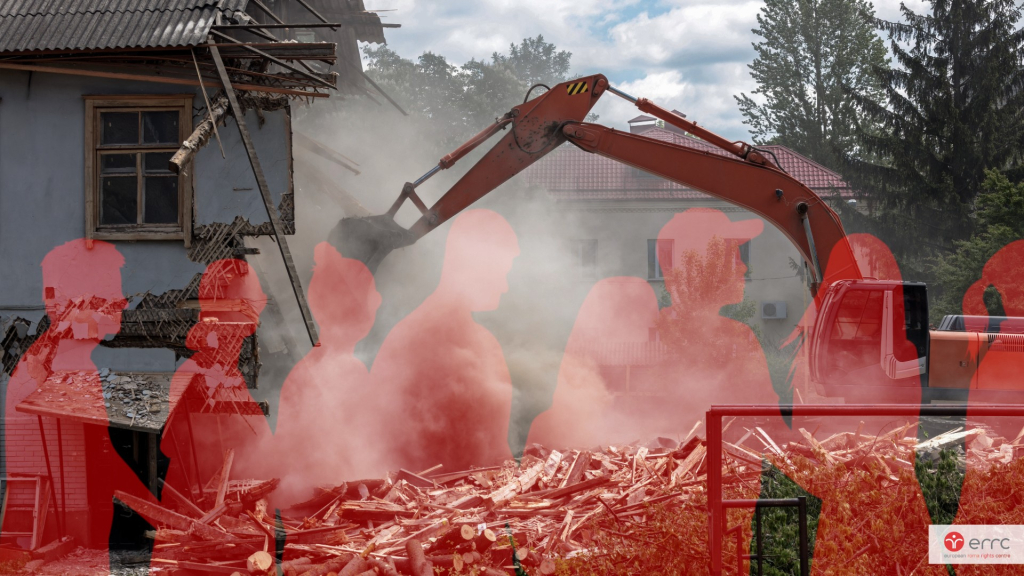Bulgarian Helsinki Committee condemns illegal mass demolition of Romani homes as a ‘blatant violation of basic human rights’
24 April 2025

The Bulgarian Helsinki Committee (BHC) condemned the illegal demolition that took place in Sofia leaving over 200 Romani people on the streets amidst the rubble, and called for immediate action from the authorities to avert a humanitarian crisis.
On Tuesday, 15 April, dozens of families were left homeless in the wake of the mass demolition of their homes in the capital's ‘Zaharna Fabrika’ district of Sofia. This action was taken by district mayor, Emil Branchevski, in collusion with the Ministry of Interior. As the bulldozers moved in, police with water cannon stood by to prevent any resistance.
The mass destruction of family dwellings was taken in blatant defiance of the interim measure imposed four days earlier by the European Court of Human Rights. On 11 April, the Strasbourg Court stipulated that no homes should be demolished until the state provided for the housing needs of those affected.
In what the Bulgarian Helsinki Committee (BHC) described as “an unprecedented disregard of this express order and in violation of Bulgarian and international law”, the mayor and the ministry went ahead and demolished all the dwellings in a single day, destroyed the people’s possessions, and left them homeless. Among those affected are minors, elderly and ill people. The BHC told Balkan Insight.
“What is shocking is not only the lack of any humanity in this deed but also the arrogant violation of international law, the likes of which we have never witnessed before.”
In an open letter to the authorities on 17 April, the BHC called for urgent action to prevent a severe humanitarian crisis, as “for the third day now over 200 people, including children, the elderly and sick people, are living in the open air.” The BHC described how the remains of the destroyed homes have not been cleared and the area is not secured, with many of the people who lived there sleeping outdoors.
The authorities’ arbitrary actions drew criticism from other Sofia district mayors who denied the claim by Branchevski of possible plans to rehouse the families in the city’s Botunetz neighbourhood. Botunetz Mayor Lilia Donkova denied any such move, and she told Balkan Insight “Simply transferring a problem from one neighbourhood to another doesn’t work.”
This callous action, leaving vulnerable people exposed to the elements, amounts to a deliberately created disaster. According to the explicit definition of the Disaster Protection Act, this illegal demolition has caused “a significant disruption of the normal functioning of society, caused by human activity, which leads to negative consequences for the life or health of the population …” On the eve of the Easter holidays, the BHC called for urgent action to be taken for disaster protection “to preserve humanity, the lives and health of the population.”
There is nothing new about antigypsysim, the demolition of Romani homes, or full-scale attacks on Romani neighbourhoods in Bulgaria. So extreme was the situation in 2020, that Council of Europe Commissioner for Human Rights Dunja Mijatović called out “the rampant intolerance manifested towards minority groups in Bulgaria”, and “deplored the climate of hostility against Roma, in particular against those who had to leave their homes following rallies targeting their communities in several localities.”
In its 2022 report on Bulgaria, the European Commission against Racism and Intolerance (ECRI) noted a pattern where Roma were targeted by mob protests which were then followed by the demolition of Romani houses by local authorities. ECRI strongly recommended that the authorities take all necessary measures to prevent threats and violence against Roma by groups of local residents; and urged that Romani homes be protected from illegal demolitions.
On current and past form, it’s odds on that this latest illegal and cruel mass demolition of family homes in the Bulgarian capital – the concrete epitome of hardcore institutional racism – will elicit no response from the European Commission. At the midpoint of the EU Roma strategic framework for equality, inclusion and participation (2020-2030), the reality for the Roma of Zaharna Fabrika, homeless amidst the rubble, is completely at odds with the Brussels rhetoric about the ‘true Union of Equality’. Their cruel predicament could not be more remote from the EU ambitions “to ensure that millions of Roma are treated equally, socially included and able to participle in social and political life without exception.”




